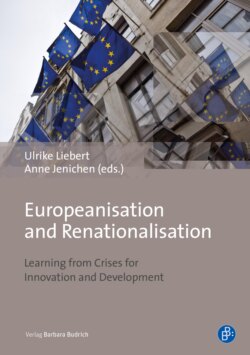Читать книгу Europeanisation and Renationalisation - Группа авторов - Страница 51
На сайте Литреса книга снята с продажи.
8. [76] Conclusions
ОглавлениеBefore the crisis in Greece, voluntary associations were unable to function as vehicles of democratic participation. With the exception of well-organised unions of SOEs and professional associations, they were weak vis-à-vis political parties and the state. For a long time, labour unions, the student movement and other associations were internally divided along the lines of political party competition. Confederations of employees and also NGOs used to be financially dependent on funds obtained from the central government. Acute antagonisms among the major political parties and a polarised political culture prevented the emergence of an autonomous sphere of civil society. In other words, civil society hardly played a political role, as political representation was mostly confined to participation through political parties. Moreover, civil society’s deliberation potential was never materialised.
Yet, the class-biased and harsh austerity measures taken by the government since 2010 under conditions imposed by Greece’s creditors, provoked a wave of social protests that initially were not led by political parties opposing the government. Grass roots movements rallied against income and pension policies, against rises in the cost of public services and cuts in social spending. Civil society was empowered in the sense that large numbers of participants joined such movements and participated in strikes and demonstrations. The poor and the socially excluded who, metaphorically speaking, normally did not have a ‘voice’, probably spoke through such movements.
Moreover, in the wake of the economic crisis NGOs spontaneously mobilised to support people in need and a plethora of informal groups and networks emerged in the social solidarity sector. Informal networks consisting of loose circles of like-minded citizens or neighbours, engaged in community work and helped provide food, clothes, shelter, health care and educational services to the most vulnerable people.
In brief, the economic crisis has opened a window of opportunity for Greek civil society which has experienced the chance to further develop in the future and strengthen its role vis-à-vis the political institutions. This opportunity has been seized less by NGOs and more by inchoate groups and networks which in the future might (or might not) develop more permanent organisational structures. This will depend on the duration of the crisis, on the fluctuation of demand for the services of informal groups and networks and on the supply of funds, time, skills and other resources by citizens and private sponsors to those informal collective actors.
In parallel to the above solidarity efforts, atypical, often violent, forms of uncivil society activism have also emerged. Since 2010, there have been occupations of government buildings, organised efforts to storm the parliament as [77] well as physical attacks against politicians. These were instances where protesters put the limits of liberal democracy to test. Attacks by small racist groups against migrants, which for a long time were tolerated by the Greek police, and violent acts of destruction of state and private property by radical left-wing groups also tested the limits of parliamentary democracy. Yet, in Greece, democratic institutions continue to function, while large numbers of citizens have exercised their collective rights through social protest and social solidarity. These mixed and contradictory trends show how complicated the nature of political developments and social innovation in times of economic crisis is.
